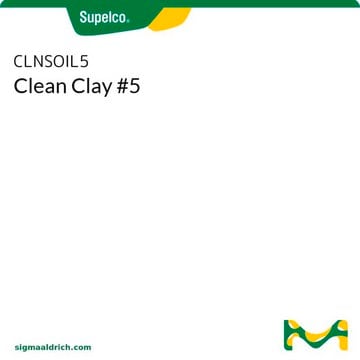682632
Nanoclay, surface modified
contains 15-35 wt. % octadecylamine, 0.5-5 wt. % aminopropyltriethoxysilane
Synonym(s):
Nanomer® I.31PS, Nanomer® clay, Montmorillonite clay
About This Item
Recommended Products
form
powder
contains
0.5-5 wt. % aminopropyltriethoxysilane
15-35 wt. % octadecylamine
matrix
Montmorillonite clay base material
particle size
≤20 μm
Looking for similar products? Visit Product Comparison Guide
Related Categories
Application
- Improve modulus
- Increase barrier
- Enhance chemical resistance
- Improve flame retardancy
- Increase heat deflection temperature (HDT)
Legal Information
Product of Nanocor®, Inc.
Signal Word
Danger
Hazard Statements
Precautionary Statements
Hazard Classifications
Aquatic Acute 1 - Aquatic Chronic 1 - Eye Dam. 1 - Skin Corr. 1B - Skin Sens. 1 - STOT RE 2
Target Organs
Liver,Gastrointestinal tract,Immune system
Storage Class Code
8A - Combustible corrosive hazardous materials
WGK
WGK 3
Flash Point(F)
Not applicable
Flash Point(C)
Not applicable
Personal Protective Equipment
Certificates of Analysis (COA)
Search for Certificates of Analysis (COA) by entering the products Lot/Batch Number. Lot and Batch Numbers can be found on a product’s label following the words ‘Lot’ or ‘Batch’.
Already Own This Product?
Find documentation for the products that you have recently purchased in the Document Library.
Customers Also Viewed
Articles
Nanoclays are clay minerals optimized for use in clay nanocomposites– multi-functional material systems with several property enhancements targeted for a particular application.
Nanoclays like montmorillonite and bentonite are used in polymer-clay nanocomposites, rheology modifiers, and drug delivery carriers.
We have discussed shortly the applications of 1:1 and 2:1 phyllosilicate material in membrane technology, as well as the basic geometric understanding of their layered structures.
Graphene's unique properties spark interdisciplinary interest; its honeycomb structure offers electrical, optical, and mechanical marvels.
Related Content
Dextrans are polysaccharides with molecular weights ≥1,000 Dalton, featuring a linear backbone of α-linked d-glucopyranosyl repeating units.
Our team of scientists has experience in all areas of research including Life Science, Material Science, Chemical Synthesis, Chromatography, Analytical and many others.
Contact Technical Service

















